June is an important month for Bissell Centre – it’s both Pride Month and National Indigenous History Month. There is a close connection between what Pride Month is all about and Indigenous history in our country.
Countless Indigenous Nations across what’s now called North America saw Two-Spirit Peoples as not only an engrained and normalized part of their culture — Two-Spirit Peoples were often highly regarded and seen as a gift from the Creator.
“They were a very important part of Cree society,” says Elder Ed Lavallee. He is a traditional Plains Nehiyaw (Cree) of the Sturgeon Lake First Nation in Saskatchewan whose career in advocacy for Two-Spirit Peoples has seen him collaborate with groups like Pride Edmonton, the Edmonton Queer History Project, and the Edmonton 2 Spirit Society. Quotes from Elder Ed Lavallee reflect the distinct experience of the Plains Nehiyah Peoples.
“They had many roles in the daily lives of their people and were respected and revered for being Two-Spirited. They were often healers, shamans, mediators in marriage and tribal disputes, keepers of their history and their lore, and taking part and often leading in their social and Spiritual Ceremonies.”
While colonial efforts tried to wipe out any non-conformity from a person’s ascribed gender, the presence of these folks never went away. It wasn’t until 1990 that this way of being was finally given a general English translation to help people across Canada understand that, for countless Indigenous Peoples today, there are far more than only two genders.

The Five Genders
For Indigenous Nations in what’s now called Alberta, there are five genders in the community: male, female, male with female spirit, female with male spirit, and transgender.
“Indigenous people believe that both the female and male spirits reside in the body of a Two-Spirit Individual and the degree of dominance of each spirit ultimately impacts the physical, emotional, mental and spiritual identity of each Two-Spirit person,” says Elder Ed Lavallee.
Rather than trying to change people to better fit with the gender they were born with, Indigenous Nations instead made room for these people and ensured they could contribute to the community with the tasks and skills they identified with most.
Males with female spirits could take on cooking and cleaning duties, were widely seen as gifted artists, and some Nations even saw them adopt orphaned children to take on a caregiver role. Females with male spirits contributed by hunting and being warriors. Some Nations saw females with male spirit folks marrying widowed women.
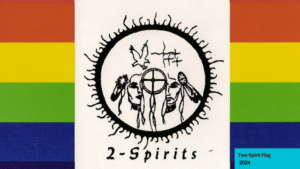
The Reverence for Two Spirit Peoples
In addition to the everyday contributions Two-Spirit Peoples made to their communities, their gift of having two spirits within them also meant they were good healers, medicine people, and visionaries. This is because the two spirits in them give them what’s called double-vision — the ability to see the world through both the male and female lens.
“The belief that Cree Two-Spirit People are special is epitomized in the existence of a powerful Two-Spirit Deity known as Qweskicanskew,” adds Elder Ed Lavallee. “In their spirituality, they believe this Spirit turns things around for the good and well-being of all things on earth. This important Spirit is called upon in prayers for help, protection and blessings.”
Two-Spirit Peoples were foundational to their communities. During colonization, Two-Spirit Peoples’ place in the world seemed to no longer exist. Through the mid- to late-twentieth century, as more Indigenous Peoples began to reclaim their identities, it was clear the different terms used in different Nations like Nádleehí (nad-lay-hee), Winkté (wink-tay), and Niso-acahk-iynew (nee-soh-achak-ee-noo) needed a translation for the wider public to understand.
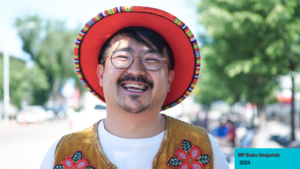
Bringing Two Spirit to the Wider Public
In 1990, at the Third Annual Intertribal Native American, First Nations, Gay and Lesbian American Conference, Elder Myra Laramee put forth the term Two-Spirit. The term is a translation from the Anishnaabemowin (Ojibwe language) term Niizh Manidoowag (neez man-ee-doo-wog). It was added to the front of the Pride acronym (2SLGBTQIA+) in recent years and was even a part of the focus for the Federal 2SLGBTQIA+ Action Plan launched in 2022.
Today, knowledge and understanding about Two-Spirit Peoples is spreading, but is still far behind from where it was before colonization. People like Dr. James Makokis (a Two-Spirit doctor from Kehewin Cree Nation) and MP Blake Desjarlais (a Member of Parliament from Edmonton) are sharing their stories to help more people understand why Two-Spirit Peoples are an essential part of their Nations – and to reduce the stigmatization around people living their authentic lives.
“They are emerging from their long decades of oppression and marginalization working toward re-establishing their rightful roles in their communities as they go through this period of rediscovery,” says Elder Ed Lavalle. “They are working to be recognized, respected and engaged in an integral manner, within Indigenous communities and society in general.”
This Pride Month and National Indigenous History Month, we’re celebrating the bravery of Two-Spirit people coming out and bringing this piece of Indigenous culture to the public forefront. We hope you’ll join us in making room for Peoples who can walk in both worlds to share their gifts and help make this world a more equitable place for everyone.
There’s an old saying that goes, “when you have more than you need, build a longer table.” Boyle Street Community Services and Bissell Centre are coming together to do just that at this year’s Friendship Feast.
This year’s Friendship Feast is on October 9, 2023, at Boyle Plaza (9538 103A Ave). Boyle Street Community Services and Bissell Centre are partnering for two meals to not only fill bellies in the community but also to celebrate the community we serve and appreciate the friendships and love that have grown.
Two Meals – Two Takes on Fall’s Favourite Feast
The first sitting will be from 11:00 a.m. to 2:00 p.m. and will be provided by Boyle Street Community Services. They will be serving up all the traditional Thanksgiving favourites like turkey, stuffing, potatoes; everything you would expect to find when family and friends get together to celebrate. Bissell will serve the second meal from 3:00 p.m. to 6:00 p.m. It will consist of Indigenous delights such as stew and Bannock from our outstanding Food Services team – a meal that’s been met with loud acclaim more than once, including recently at our National Truth and Reconciliation Day Round Dance.
A Friendship Feast Is About Coming Together
Our friends at Boyle Street Community Services recently moved out of their current location and are waiting for their new home, King Thunderbird Centre, to finish construction. We’re helping out by providing some temporary space for Boyle Street Community Service’s programs – so we can continue meeting our community members’ needs.
“This year, we’re not just filling bellies; we’re celebrating our community, appreciating the bonds we’ve forged, and sharing love through two unique meals,” says Director of Marketing and Communications Nivedita Kunjur. “It’s more than a feast; it’s a testament to friendship, unity, and the power of coming together. We’re not just serving food; we’re truly building a longer table.”
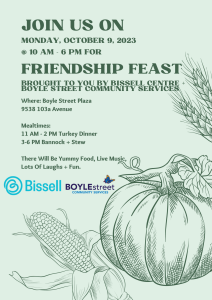
The new Indigenous Engagement program is a spark of connection, igniting a deep sense of belonging through the customs that define Indigenous identities. Together, we remember the past, learn from our ancestors’ wisdom, and embrace it all with open hearts. In this shared journey, we strengthen our bonds and foster understanding.
Guided by the Seven Sacred Teachings: Love, Respect, Courage, Honesty, Wisdom, Humility, and Truth, this program serves as a bridge to Indigenous heritage and a platform for nurturing improved relationships between Indigenous and non-Indigenous communities across Canada.
Launching for National Day for Truth and Reconciliation
“Listening attentively to the voices of our community, we have crafted programs that provide opportunities to connect with Indigenous roots,” says Sarah Higgins, Director of Indigenous Engagement at Bissell Centre. “We focus on celebrating age-old traditions while exploring new ways to honour them.”
The program has been active over 2023 but is officially launching at the end of September – consciously coinciding with National Day for Truth and Reconciliation. Higgins explains how launching this new Indigenous Engagement program at the same time as this important ceremony for Indigenous communities is part of a larger reclamation of Indigenous culture and an important part of the healing that the community needs.
Reclaiming Indigenous Cultural Practices
“We have a large overrepresentation of Indigenous people accessing Bissell Centre programs,” says Higgins. “This program is a direct response to what we were hearing directly from the community. Holding our ceremonies, performing our smudges and our songs, collecting our medicines, and accessing the wisdom of our elders – these are all foundational to what we’re providing in this program.”
She goes on to point out that the ceremonies and customs practiced in the Indigenous Engagement program would have been illegal up until 1951, when the Indian Act was first amended to end its discrimination against Indigenous traditions. Higgins is proud to lead a team that ensures the customs and rituals practiced by Indigenous peoples have a home at Bissell Centre – where they can reach a lot of people who need it most.
Discover more about how the new Indigenous Engagement program by Indigenous folks, for Indigenous folks, is helping more people honour and connect to their culture.
For Sarah Higgins, Director of Indigenous Engagement at Bissell Centre, the word that comes most to mind when she thinks about National Day for Truth and Reconciliation is ceremony. She explains how every Indigenous member of Bissell Centre’s staff and community has a direct correlation to or has been directly impacted by residential schools.
“It’s a way to express our grief and heal from our losses in a healthy and enriching way,” says Higgins. Bissell Centre is holding its own National Day for Truth and Reconciliation ceremony on September 29 from noon to 9:00 p.m. and will feature a pipe ceremony, a Round Dance, and a traditional feast provided by Red Seal Indigenous Chef Matthew Potts.
A History of Indigenous Cultural Ceremonies
While Bissell Centre’s event in downtown Edmonton (10527 96 Street) is open to everyone, it’s far from a celebration. National Day for Truth and Reconciliation was born from the 94 Calls to Action from the Truth and Reconciliation Commission – and after mass graves were found at multiple sites of residential schools across the country. Cultural Support Worker Brandon Lee-McDonald explains how at one point, holding this very event would have landed everyone participating in prison.
“Up until 1951, when the Indian Act was amended, we weren’t allowed to have our drum circles, we had to change the names of our ceremonies, we essentially had to hide in the bushes to express our cultural identity,” says Lee-McDonald. “Our ancestors suffered and died so we could hold our ceremonies in public again. Without their sacrifice, we wouldn’t be able to have this ceremony in downtown Edmonton.”
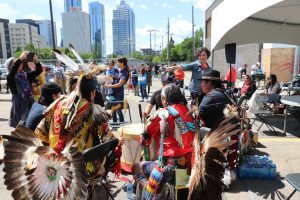
What this Day Means at Bissell Centre
A tenant of the National Truth and Reconciliation event at Bissell Centre is honouring those who survived residential schools. There will be a list of survivors in attendance during the event, to recognize their resilience in the face of an atrocity that took so many.
It might look like we’re celebrating at our National Day for Truth and Reconciliation event, but we’re mourning and grieving,” says Lee-McDonald. “We’re acknowledging the survivors of residential schools and honouring them. This is our day to mourn in a healthy way from our past traumas.”
While everyone at the National Truth and Reconciliation Day event at Bissell Centre will be commemorating that they’re still here, there is still a lot of healing to be done. National Day for Truth and Reconciliation may be about grief and healing, but it’s also about empowerment and reclamation.
“This is a day given to us by the Creator,” says Lee-McDonald. “It was given to help us grieve and heal and be healthy. We want to take this day for our ceremony and live our truths in our cultural identity. It’s a big deal we can hold this ceremony on the streets of Edmonton.”
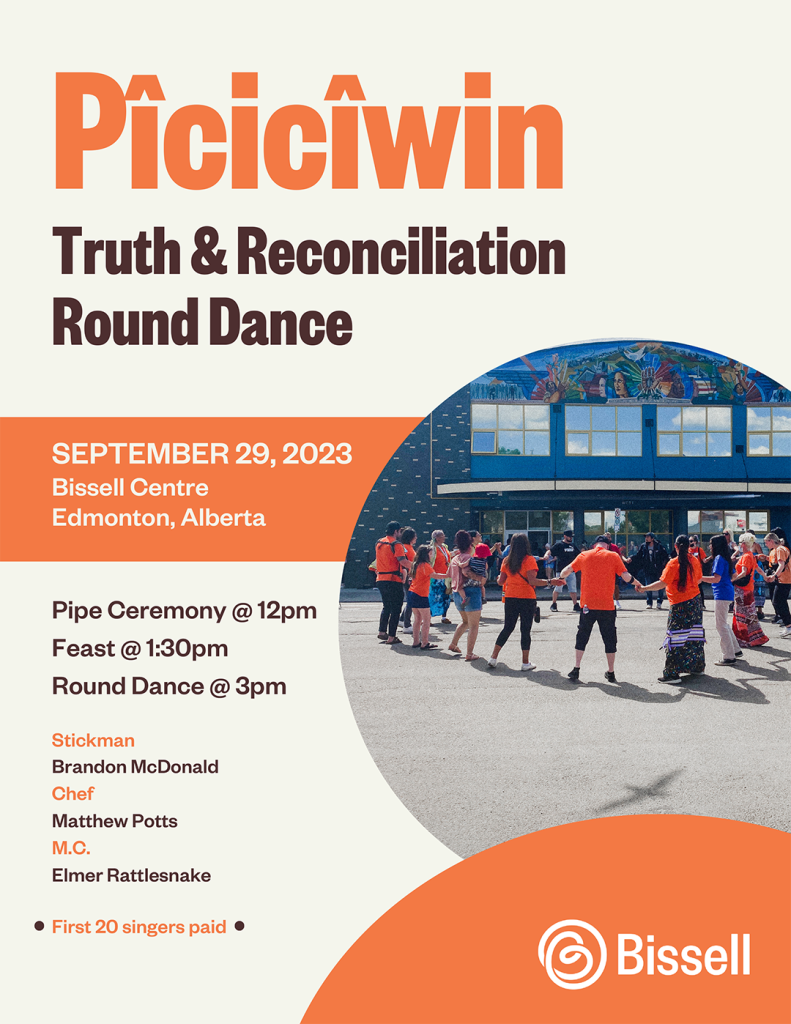
Individuals connected to our Fetal Alcohol Spectrum of Services (FASS) program contributed to a book about the challenges and realities of navigating life with Fetal Alcohol Spectrum Disorder (FASD). Under the guidance of Jared Epp, Carleton University PhD candidate and former housing support worker with Bissell Centre, who facilitated the group in sharing stories of what was most important to them. Fifteen people shared their stories, captured in this captivating collection. Born Broken is a book that’s an immersive experience into what it means to have FASD and the barriers it can create.
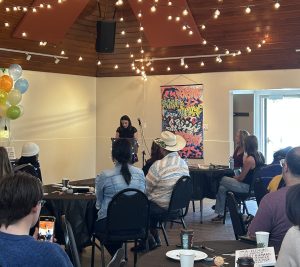
The group celebrated the release of this Born Broken book this past month with a small and intimate reading and sharing. Everyone who contributed to the book received a copy, and a few were shared around the community to help spread its positive message.
Copies of Born Broken books are available to purchase from the Bissell Thrift Shop on 118 Avenue or Paper Birch Books at 10825 95 Street.
Below is the preface to the book, written by Jared Epp. This firsthand experience of seeing the collection come together illuminated the importance of this book for the contributors and for those about to read it and gain a better understanding of FASD.
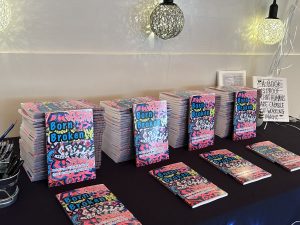
Preface from Born Broken
A group of individuals connected to Bissell Centre’s Fetal Alcohol Spectrum of Services (FASS) came together for a book project. The goal was to provide an opportunity for folks to share whatever kind of content they wanted. Leaving it open-ended allowed the individuals participating in the project to share what was meaningful to them. Their contributions didn’t have to only be about living with Fetal Alcohol Spectrum Disorder (FASD). A number of contributors did want to share their stories about living with FAD, about their daily challenges, as well as the impact of receiving their diagnosis. Others talked about different things. There are stories about adventure on Edmonton’s public transit, sewing denim, dreaming, making music and art, the challenges of finding and keeping a job and many other events and situations the reader will soon encounter.
Woven throughout the book are stories, ideas, frustrations, thoughts and reflections, offering a window into the experience of entering into the world a certain way.
In our last group meeting, we had to come up with a title for the book. Each contributor present was invited to come up with some titles, and then there would be a vote.
These were the title ideas:
- Born Broken
- The Struggle is Real
- Drumbeats of Hope
- Light in the Dark
- Perfectly Imperfect
- Getting Dealt a Bad Hand
Everyone had agreed on Heidi’s subtitle, “Reflections on Life and Resiliency from Individuals living with FASD,” as it put a positive spin on the main title.
Born Broken won by one vote over The Struggle is Real and Light in the Dark. There was a lot of discussion and debate on the chosen title. Some people felt it was too negative, but they also acknowledged it’s sentiment. In many ways, the titles and the debate around it set a theme that echoes through each story: individuals confronting and overcoming something they were born with, have no control over, and yet seems invisible to those outside the lived experience of FASD. The reader is invited to encounter the diverse contributions within the book, keeping in mind the unsettled nature of its title and the realities of living with FASD.
-Jared Epp
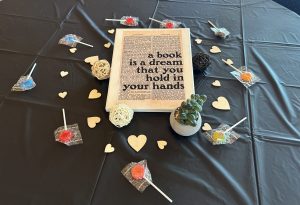
Bissell’s National Indigenous Peoples Day celebration weeks ago brought 96 St. right outside Bissell to life. Bissell Centre has been celebrating National Indigenous Peoples Day, proclaimed in 1996 by the Canadian Government, for well over a decade! This year, it was so much more than a block party– our team made sure this was a celebration to remember.
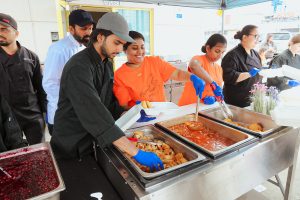
Keeping Traditions Alive
Our Food Services kitchen team made traditional stew and Bannock for everyone who attended. In total, they served more than 900 meals! Elders from the community held a traditional pipe ceremony to kick things off. They shared stories of struggle and expressed why the customs and traditions they grew up with are so important to folks from Indigenous communities.
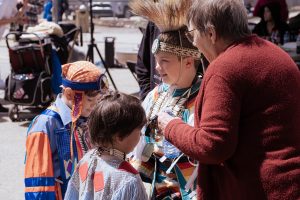
Energetic Local Performances
Families enjoyed the traditional hand games from Indigenous communities. Plus, dance and music performances from the Thunder Lake Singers & Dancers and flutist Theo Waskahat. The block was alive with music, drumming, and dancing for the whole community to enjoy.
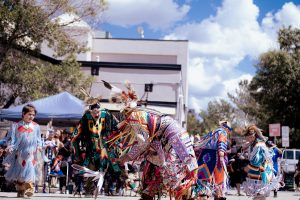
Sharing and Learning Together
National Indigenous Peoples Day is always an amazing celebration, but this year’s was truly one to remember. We’re so happy and grateful for everyone who came out, participated, shared their gifts, and helped make sure Indigenous customs and traditions will stay alive for the people who need them most.
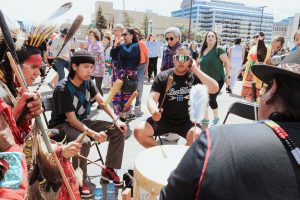
National Indigenous Peoples Day 2023 Photo Highlights
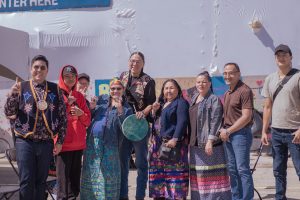
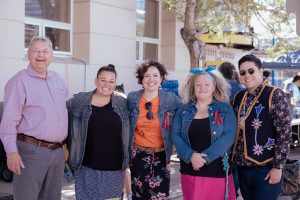
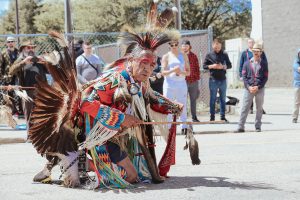
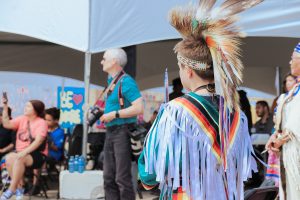
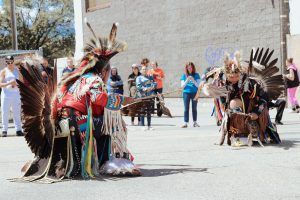
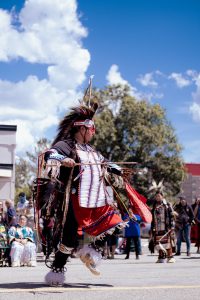
Every year, Tim Horton’s holds its Smile Cookie fundraiser, where each local franchise owner can pick a charity in their community that the proceeds from cookie sales will support. It’s a great way to help raise money for great causes directly in our communities!
This year, a group of Edmonton franchise owners decided to try something different. The group agreed to pool their efforts to make a larger collective impact – ultimately choosing Bissell Centre as their charity of choice.
And just like that, this quickly became one of the largest fundraising campaigns we’ve held – raising more than $400,000 in a single week.
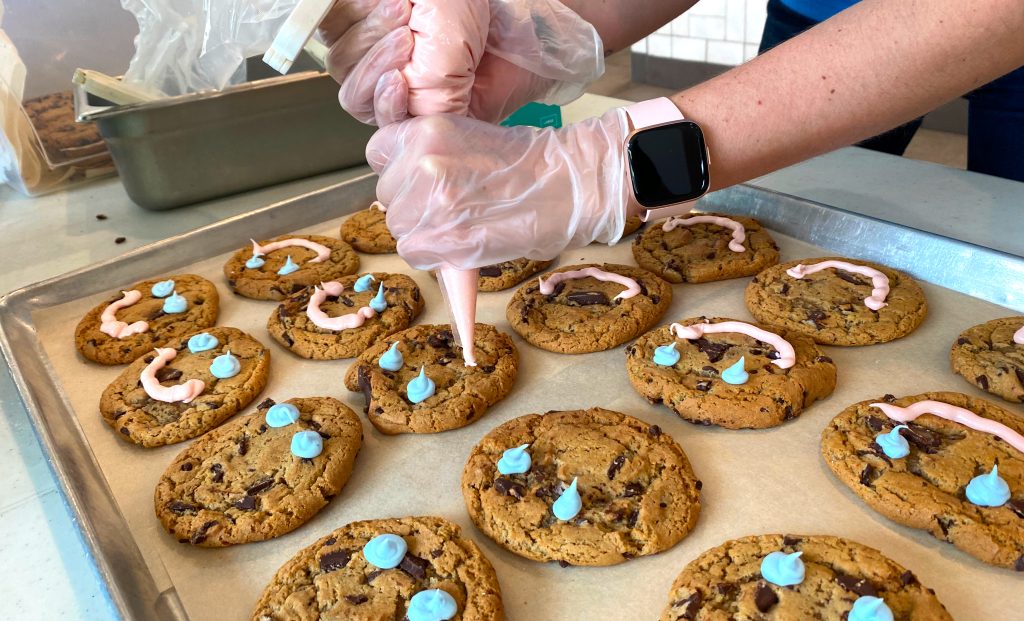
Bissell’s Child and Family Supports
Funds from this spring’s Smile Cookie campaign all went to support our Child and Family Supports Program. Last year, we helped more than 1,600 families find their way out of poverty and emergency situations. These programs make a massive impact that people in Edmonton don’t often see.
“It’s things like connections to free pre-natal care, parental supports, or free access to emergency essentials like diapers and formula,” says Jonathan Mackereth, Development Officer with Bissell Centre.
Mackereth explains that Bissell has run a childcare for more than 50 years, serving families in the downtown core. The centre is fully staffed by Early Childhood Education professionals, providing Early Childhood Development for short- and long-term – serving childcare from newborns to six years old.
“There’s are enough challenges finding quality childcare – finances shouldn’t be one of them,” says Mackereth “Lots of parents even drop-off their kids to access other programs like our Employment Services or Financial Empowerment workshops, making it an essential part of our approach to ending poverty.”
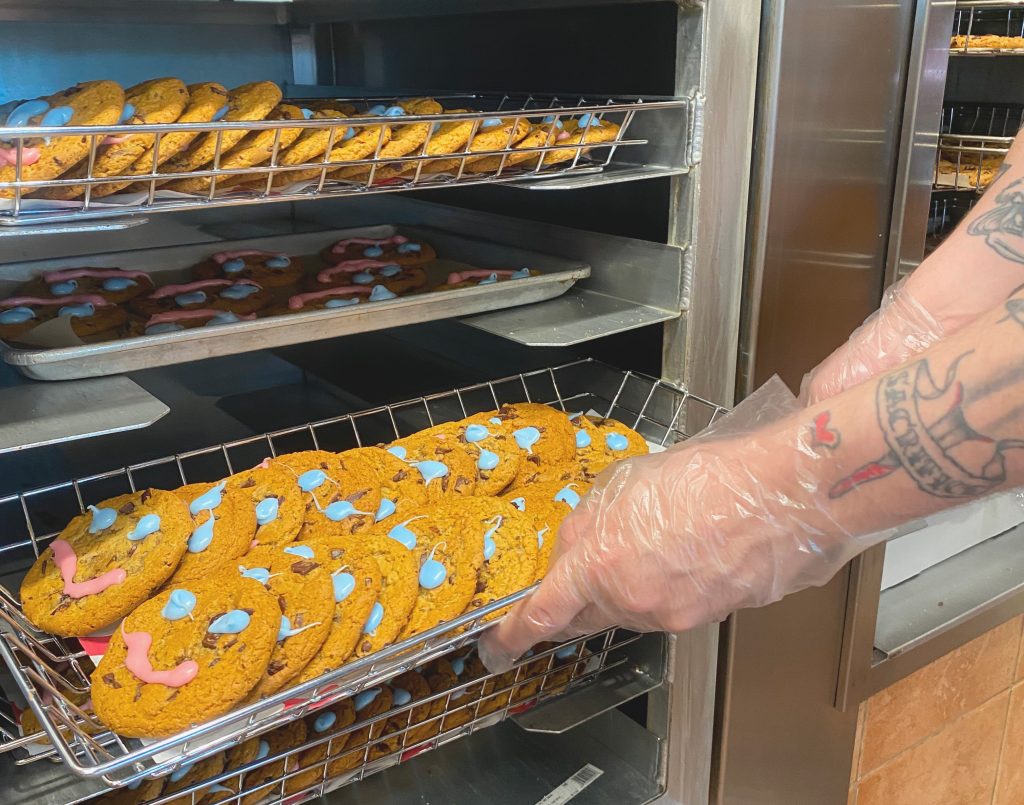
Supporting and Celebrating Together
Learning that 147 Tim’s locations all came together to support Bissell Centre, “caught us a little off guard,” Jonathan jokes. “We knew right away opportunities like this don’t come often. We pooled resources into making sure folks knew that buying a cookie would help a child.”
Team members from Bissell Centre could be found at a few different locations around the city during this campaign. Whether it was celebrating with giant cookie cut-outs by the drive-thru, or putting on hair nets and decorating cookies, the teams stepped up to make the week unforgettable.
By the end of the campaign, more than 300,000 cookies were sold – raising more than $464,000! People didn’t hesitate to add a smile cookie to their regular double-double orders – with some businesses and schools pre-ordering up to 1,500 cookies at a time.
“On the first day, we had a manager come out to see us,” Jonathan recalls. “She said in the first two hours of the morning rush, they sold more than a quarter of the cookies they sold for the entire campaign last year.”
We can’t thank the Edmonton Tim’s franchisees enough for all the support they’ve given us. This will directly impact families and children experiencing houselessness and poverty in Edmonton. Thank you for helping us make Edmonton a little bit more of an equitable place to call home.
Originally published February 7, 2023
Updated January 15, 2024
Coldest Night of the Year is coming up quick – and no doubt this year has a lot of fundraising events in store. So whether you’re joining our February 24 Walk for Bissell or if you’ll be raising funds through an event of your own, there are a couple of things to keep in mind when you’re looking to raise money to make a difference in your community.
Check out these top seven fundraising tips and be sure to share your own tips on social media.
Work Smarter, Not Harder
Many hands make light work. Recruit as many people onto your team as you can. More people can help you reach your team’s fundraising goal faster!
Ask Everyone
You won’t get a donation if you don’t ask for it. Sometimes the biggest donations come from the most unexpected places. Go beyond friends and family to ask co-workers, teachers, favourite businesses, your dentist, your lawyer, your boss or even your vet. Don’t be scared! Send them an email with your link and you’ll be surprised how many will happily contribute to your campaign.
Ask Directly
Write a short message and personalize it before sending it directly to each person via email, text, or direct message. People are much more likely to respond to something addressed to them. But this is only one touchpoint that can help you convince your friends, family, coworkers, and larger network to contribute to your cause.
Post On Social Media
Post on all your platforms often to reach as many people as possible. Don’t forget to include a link directly to your fundraising page. Use photos from previous events or even a photo of you participating in a campaign. Ask others to share with their followers to increase your reach further. And make sure to tag everyone relevant in the post and include any special hashtags for the event – in this case it’s #WalkforBissell.
Share Your Why
People are more likely to show their support when they understand why this cause is important to you. Tell the story of how you got involved with your cause and why you care about it so much. It helps people understand why they should care too.
Remind Them
Did they say they would donate, but the event is only a few days away and you haven’t seen a donation in their name? Politely ask them again. They won’t be annoyed – they likely just forgot.
Say Thank You
Thank every person individually who donates to you – and as soon as possible. After the event, share details of how much you raised and post photos of you participating. Write a message you can send to all your donors to update them on how the event went, how much money was raised, and most of all, why their contribution was so important.
Have any other fundraising tips to recommend? Any huge fundraising victories you want to share? Let’s keep the conversation on social media. Like us on Facebook, Follow us on Instagram and Twitter, and we hope to see you when we walk through downtown Edmonton on February 24, 2024!
Originally published on January 20, 2023
Updated January 15, 2024
Spending a night outside in Edmonton’s harsh winters can take its toll on people. In 2021, it’s estimated that 222 people experiencing houselessness in Edmonton died – many from avoidable deaths such as from exposure. That is a 70 per cent increase from the year before. Between 2021 and 2022, there were 786 reported cases of extreme frostbite, with 91 leading to amputations.
For countless Edmontonians, there is a very real prospect that they may experience houselessness. The Coldest Night of the Year fundraiser walk through downtown gives a small glimpse into what experiencing houselessness can be like.
This Year’s Walk for Bissell
Our goal in 2024 is to raise upwards of $200,000, after last year’s successful walk where we raised $190,000. Walkers are coming together on February 24, 2024, for either the two or five kilometre walk through downtown Edmonton – with teams raising funds since December and continuing to raise funds until one month after the walk.
Not only is this a fun way to bring awareness to a serious issue in our city, but you can also see directly how those funds raised make a difference to the community. This is the sixth year that Bissell Centre is taking part in Coldest Night of the Year.
The funds raised for the downtown Coldest Night of the Year walk go directly back to Bissell Centre’s programs, ensuring that our city’s most vulnerable have the services they need to live with a better quality of life.
A History of Helping Those Experiencing Houselessness
Coldest Night of the Year was established in 2011 when three Ontario Ministries wanted to bring attention to what folks who are experiencing houselessness need to endure over Canada’s harsh winters. They started with a goal to raise $40,000 – by the end of the walk, they had raised well over $111,000.
This fundraiser was quickly adopted across Canada and the US, with 166 different locations hosting their own walks with funds going back to local community organizations. In 2022, more than $12 million was raised by more than 31,000 individual walkers in Canada and the US.
You can still contribute to this amazing fundraiser. Donate to a team (or start your own!), donate to someone walking, or support us directly at Bissell Centre by donating to the Walk with Bissell team. Check out our local event site and contribute today. With your help, we can reach our $200,000 goal and continue serving those most vulnerable in our city.
…Sadly, this is a decision people experiencing houselessness have to make every single day.
For 6these folks in Edmonton, gaining access to new, clean underwear is difficult. Some individuals may wear the same pair of underwear for months at a time, and some may go without underwear for just as long. Underwear is an issue we don’t often consider but can be a serious problem for those in the community.
Underwear is one of the most requested items by the people who use Bissell Centre services, but one of the least donated items.
“It doesn’t feel comfortable when you’re not wearing any underwear, and no one likes to put dirty underwear back on after a shower. Women have accidents; they need access to clean undergarments.” – Angie
So, let’s pass the question on to you. Would you rather wear dirty underwear, or go without?
Let’s weigh each of the options:
Wear Dirty Underwear
Wearing dirty underwear may not seem like a big deal at first, but as the weeks pass, bacteria and microbes will accumulate causing an embarrassing odour, irritating rash, and infection on your skin down there!
If you’re a woman and you have a leak or accident during that time of the month, you’ll have no choice but to continue wearing the dirtied underwear, which can contribute to even more bacteria and microbe growth.
Not to mention, after you shower and get all squeaky clean, you won’t have a fresh pair of undies to slip into and will have to pop on the smelly, old, bacteria-ridden pair.
Go Full Commando
Going without underwear sounds fun —“freeing” even —but what happens when the inevitable chafing and skin irritation come along with it? You’ll have to deal with that gnarly skin rash for weeks on end!
If you’re a woman and do not have access to female hygiene products, this decision could result in the use of unsanitary or improvised hygiene products, which could lead to an infection.
Without the barrier of underwear, there’s a higher risk for foreign bacteria to make contact with your skin. Among other issues, there’s also a greater chance of fungi development because your underwear isn’t there to absorb your sweat.
Wearing underwear is something that we often take for granted, but when faced with a decision like this, it is easy to see why clean underwear is so important to those who don’t always have access to it.
When a person experiences houselessness, underwear issues can contribute to a multitude of larger health problems and discomfort. For many people, especially folks experiencing poverty and houselessness, the availability of fresh, clean underwear makes all the difference.
This is why we created our #DropYourGonch campaign: so that no one in our community would have to make the decision between wearing dirty underwear, or going without.
The Drop Your Gonch campaign aims to fill gaps in the Bissell Centre community closet by reaching out to our supporters to help stock it full of new underwear for folks experiencing poverty.
The clean underwear donated by our supporters helps to provide our community with better personal health and hygiene, and a restored sense of dignity and self-worth.





















